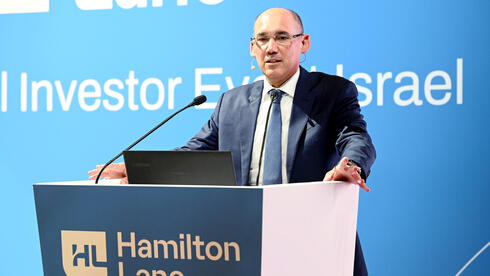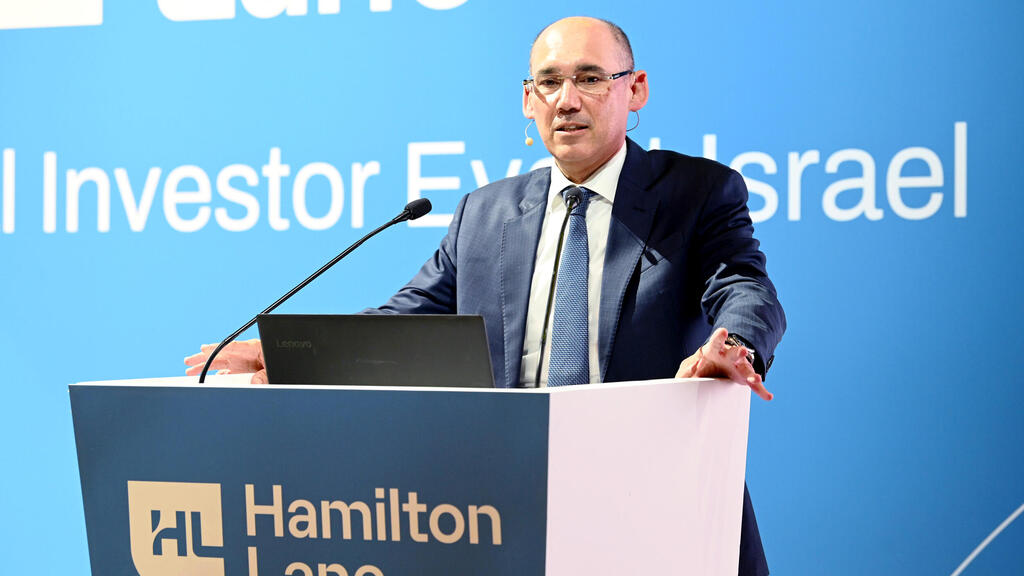
Bank of Israel: “Israel has a good record in terms of coming out of military events”
Professor Amir Yaron made the remarks during his Keynote Speech at the Hamilton Lane Annual Investor Event in Israel
“Thank you all for showing up here, particularly these days. First and foremost, this is a point of solidarity. Beyond that, business is business, and showing up here is a vote of confidence in the Israeli economy. So we want to thank you… The Israeli economy has solid foundations and continues to be an integral part of the global investment map. Foreign investments in the economy are important to the Israeli economy and are an important fuel for driving the high-tech and innovation industries in Israel. We will continue to operate in the bank's areas of responsibility and with the tools at our disposal to support the Israeli economy."
These opening remarks were made by Professor Amir Yaron, Governor of the Bank of Israel at the Hamilton Lane Annual Investor Event in Israel. Speaking to a crowd of roughly 200 investors, founders, and bankers, he outlined the Israeli economy and highlighted some of the strengths and challenges it faces during wartime. Notably, how employment in the construction sector has suffered but how the high-tech sector can alleviate some of those pressures.
1 View gallery


Prof. Amir Yaron, Governor of the Bank of Israel at the Hamilton Lane Annual Investor Event in Israel
(Photo: Kobi Koenaks
)
“We still have a way to go to return to where we were supposed to be,” he said. “Obviously, given the uncertainty in the economy, this is a challenge.”
Prior to serving as Governor, Yaron served as Professor of Banking and Finance at the Wharton School, University of Pennsylvania. The Bank of Israel was founded in 1954 and is located in Kiryat HaMemshala in Jerusalem with a branch office in Tel Aviv. Its primary objective is to maintain stability in prices and the financial system in Israel - no easy feat for a country both recovering from the strain of the pandemic and also being thrown into internal political and civil unrest by potential judicial reform and the ongoing war with Hamas.
“We were on what Governors like to call a ‘super softest landing’ - we were growing like maniacs out of COVID and we were proudly on our way to grow 3.5% in 2023 before the war started,” he told the crowd. “And it’s not as though we didn't have tough times before the war given the judicial issues.”
One of the primary areas that the Governor highlighted was its problems in the construction sector: one-third of Israel’s construction workforce is Palestinian - a sector of society who are currently barred from entering the country due to the war. “That is a drag on the economy,” he admitted. “We don’t have all the workers we need. The government wants to take employers from overseas but that takes time.”
Professor Yaron was speaking at the Investor Event hosted by Hamilton Lane. The private markets investment management firm was founded in 1991 and has been the biggest in Israel for over 20 years. With $903 billion Assets Under Management, it has experienced a 93% growth since 2018 (up from $469 billion) and is the biggest allocator of private markets worldwide. As of 2023, it has more than 2,000 clients and investors in over 50 countries. The company has 22 offices globally in North America, Europe, and the Middle East and Asia-Pacific.
Despite the areas that are facing challenges, the Governor highlighted the resilience of the Israeli economy given its ability to historically bounce back from challenging times. “Israel has a very good record in terms of coming out of military events,” he told the crowd. “We tend to grow very fast after these military events. Q4 2023 was after the war and saw a contraction of -21%, but in Q1 2024 we grew at 14%.”
There are many reasons for this, and the Governor praises Israel’s high-tech sector as a prominent player in the recovery efforts. More than 50% of the country’s exports are from Startup Nation alone, and its salaries provide one-third of the country’s income tax. “It contributes a lot to the recent growth in Israel,” he said, highlighting how its human capital percentage in the sector rests at 9.5% - towering above other countries worldwide. It is also expected to recover better than in previous eras like 2001, which was plagued by the Second Intifada and the pop of the dot-com bubble, because it is more diversified than before and more companies are already in the production stage.
In total, Professor Yaron painted a positive outlook for the future of the country, albeit not without its challenges: While Israel has shown historical resilience in times of war, it isn’t the time to ignore more systemic issues like education, the growing Haredi community, and the overall endgame strategy of the war. “Israel has a resilient economy, it knows how to bounce back - as we saw with Covid,” he concluded. “Our entrepreneurs and VCs are known everywhere and this is important. Nonetheless, we have challenges in terms of going forward… The elephant in the room is how long this will all take.”
The Hamilton Lane Investor Event 2024 was held in Israel and highlighted some of the most noteworthy updates in the industry. It contained remarks from Professor Yaron as well as a Fireside Chat moderated by Managing Director, Head of Hamilton Lane Israel Limor Beker who hosted a conversation between Co-CEO Juan Delgado-Moreira and Executive Co-Chairman Mario Giannini. The event concluded with a dinner and cocktails celebration that showed a sign of unity with Israel as it continues to overcome its economic challenges brought on by the war with Hamas.














